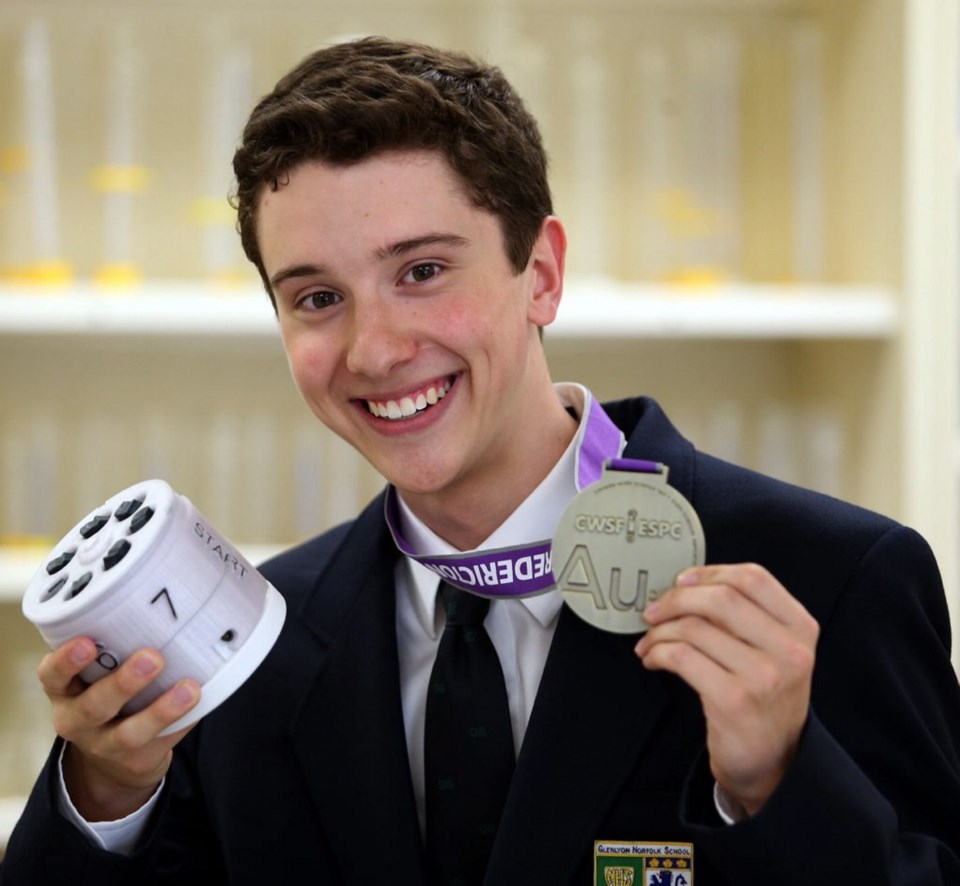Nathan Kuehne went to the Canada Wide Science Fair two years ago and nothing has been the same since.
It’s not so much that the Glenlyon Norfolk School student won a silver medal for research on the optimum amount of charcoal in soil for plants.
It’s more that he got his first look at the type of research being done by other students across the country.
“Kids had developed new ways to create batteries,” he said. “Kids had actually developed treatments for cancer.
“I hadn’t been exposed to that kind of high school research before.”
Here were average high school students devoting hundreds of hours outside the classroom to research that could really make a difference to people’s lives, he said.
Inspired, he returned home and embarked on work to develop a urine test for tumour-based cancers under the tutelage of Fraser Hof at the University of Victoria.
In his understated way, Kuehne, 17, said the project was “largely successful,” picking up a gold medal in his Grade 10 year.
“The problem was it required an expensive machine to run,” he said, whereas his goal had been to develop an at-home test.
He proceeded to modify the test in Grade 11 and found that, while the new version didn’t work for cancer, it was effective at monitoring phenylketonuria, or PKU. Those with the genetic disorder are unable to break down the essential amino acid phenylalanine, which is commonly found in protein-rich foods and some artificial sweeteners.
The disease affects about one in 12,000 newborns in North America, according to the website of Canadian PKU and Allied Disorders Inc., a non-profit organization. If left untreated, the disorder can lead to developmental disabilities and other neurological problems.
Once Kuehne discovered that his test could be used to monitor phenylalanine levels, he learned there was a desperate need for an at-home device that would allow people with PKU to monitor their condition and prevent symptoms. Other tests can take weeks to give results, while Kuehne’s takes less than 10 minutes.
“That motivated me, but also gave me an acute sense that this is something that could really make a difference,” he said. “People are suffering without a test like this right now.”
So last summer, while other young people his age were at the beach or otherwise enjoying their vacation, Kuehne was putting in eight-hour days in Hof’s UVic laboratory.
“To excel at science fair, you have to be willing to try experiments that you don’t know if they’re going to succeed,” said Erin Dallin, Kuehne’s chemistry teacher and mentor at Glenlyon Norfolk.
“There were times when it just didn’t work and he came back to the lab the next day and kept going. So that’s a lot to ask of somebody who is a teenager.”
Kuehne’s drive and determination led him to a first-place finish in the Vancouver Island Regional Science Fair and another gold medal at the Canada Wide Science Fair, where he finished in the Top 10 among 469 competitors.
He recently filed a patent application for his self-diagnostic test and hopes to publish his work in a peer-reviewed journal.
“I hope to keep working on it,” he said.
The son of a university professor and an accountant, Kuehne plans to pursue a career in engineering or medicine with a focus on research.
“I love exploring new boundaries,” he said, “but at the same time, I like seeing them applied to people.”



